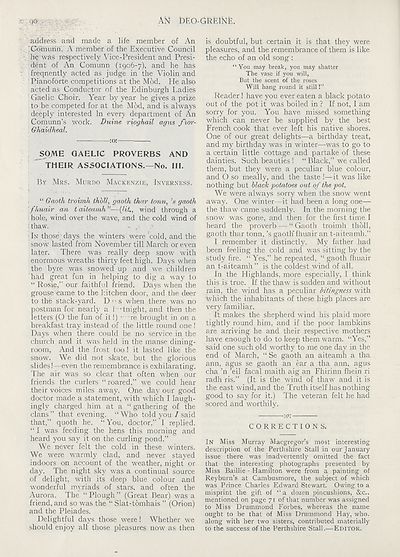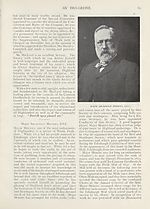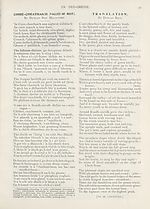An Comunn Gàidhealach Publications > Deo-gréine > Volume 3, October 1907-September 1908
(88) Page 90
Download files
Complete book:
Individual page:
Thumbnail gallery: Grid view | List view

<)6 . .
AM bEO-GRtlMfe.
address and made a life member of An
Comunn. A member of the Executive Council
he was respectively Vice-President and Presi¬
dent of An Comunn (1906-7), and he has
freqnently acted as judge in the Violin and
: Pianoforte competitions at the Mod. He also
acted as Conductor of the Edinburgh Ladies
Gaelic Choir. Year by year he gives a prize
; to be competed for at the Mod, and is always
: deeply interested In every department of An
’ Comunn’s work. Duine rioghail agus fior-
Ghaidheal.
SOME GAELIC PROVERBS AND
THEIR ASSOCIATIONS.—No. III.
By Mrs. Murdo Mackenzie, Inverness.
“ Gaoth troimh thbll, gaoth thar tonn, ’s gaoth
fhuair an taiteamh”—(/»&, wind through a
I hole, wind over the wave, and the cold wind of
i thaw. . :-
In those" days the winters were cold, and the
snow lasted from November till March or even
later. There was really deep snow with
enormous wreaths thirty feet high. Days when
the byre was snowed up and we children
had great fun in helping to dig a way to
“ Rosie,” our faithful friend. Days when the
grouse eame to the kitchen door, and the deer
to the stack-yard. D^s when there was no
postman for nearly a 1 "Anight, and then the
letters (O the fun of it!) T re brought in on a
breakfast tray instead of the little round one!
Days when there could be no service in the
church and it was held in the rrlanse dining¬
room, And the frost too ! it lasted like the
snow. We did not skate, but the glorious
slides!—even the remembrance is exhilarating.
The air was so clear that often when our
friends the curlers “ roared,” we could hear
their voices miles away. One day our good
doctor made a statement, with which I laugh¬
ingly charged him at a “ gathering of the
clans ” that evening. “ Who told you I said
that,” quoth he. “ You, doctor,” I replied.
“ I was feeding the hens this morning and
heard you say it on the curling pond.”
We never felt the cold in these winters.
We were warmly clad, and never stayed
indoors on account of the weather, night or
day. The night sky was a continual source
of delight, with its deep blue colour and
wonderful myriads of stars, and often the
Aurora. The “ Plough ” (Great Bear) was a
friend, and so was the “ Slat-tbmhais ” (Orion)
and the Pleiades.
Delightful days those were! Whether we
should enjoy all those pleasures now as then
is doubtful, but certain it is that they were
pleasures, and the remembrance of them is like
the echo of an old song :
“You may break, you may shatter
The vase if you will,
But the scent of the roses
Will hang round it still!”
Reader! have you ever eaten a black potato
out of the pot it was boiled in ? If not, I am
sorry for you. You have missed something
which can never be supplied by the best
French cook that ever left his native shores.
One of our great delights—a birthday treat,
and my birthday was in winter—was to go to
a certain little cottage and partake of these
dainties. Such beauties ! “ Black,” we called
them, but they were a peculiar blue colour,
and O so meally, and the taste !—it was like
nothing but black potatoes out of the pot.
We were always sorry when the snow went
away. One winter—it had been a long one—
the thaw came suddenly. In the morning the
snow was gone, and then for the first time I
heard the proverb — “ Gaoth troimh tholl,
gaoth thar tonn, ’s gaoth*fhuair an t-aiteamh.”
I remember it distinctly. My father had
been feeling the cold and was sitting by the
study fire. “ Yes,” he repeated, “ gaoth fhuair
an t-aiteamh ” is the coldest wind of all.
In the Highlands, more especially, I think
this is true. If the thaw is sudden and without
rain, the wind has a peculiar bitingness with
which the inhabitants of these high places are
very familiar.
It makes the shepherd wind his plaid more
tightly round him, and if the poor lambkins
are arriving he and their respective mothers
have enough to do to keep them warm. “Yes,”
said one such old worthy to me one day in the.
end of March, “ Se gaoth an aiteamh a tha
ann, agus se gaoth an ear a tha ann. agus
cha ’n ’eil facal maith aig an Fhirinn fhein ri
radh ris.” (It is the wind of thaw and it is
the east wind, and the Truth itself has nothing
good to say for it.) The veteran felt he had
scored and worthily.
CORRECTIONS.
In Miss Murray Macgregor’s most interesting
description of the Perthshire Stall in our January
issue there was inadvertently omitted the fact
that the interesting photographs presented by
Miss Baillie - Hamilton were from a painting of
Reyburn’s at Cambusmore, the subject of which
was Prince Charles Edward Stewart. Owing to a
misprint the gift of “a dozen pincushions, &c..
mentioned on page 71 of that number was assigned
to Miss Drummond Forbes, whereas the name
ought to be that of Miss Drummond Hay, who.
along with her two sisters, contributed materially
to the success of the Perthshire Stall.—Editor.
AM bEO-GRtlMfe.
address and made a life member of An
Comunn. A member of the Executive Council
he was respectively Vice-President and Presi¬
dent of An Comunn (1906-7), and he has
freqnently acted as judge in the Violin and
: Pianoforte competitions at the Mod. He also
acted as Conductor of the Edinburgh Ladies
Gaelic Choir. Year by year he gives a prize
; to be competed for at the Mod, and is always
: deeply interested In every department of An
’ Comunn’s work. Duine rioghail agus fior-
Ghaidheal.
SOME GAELIC PROVERBS AND
THEIR ASSOCIATIONS.—No. III.
By Mrs. Murdo Mackenzie, Inverness.
“ Gaoth troimh thbll, gaoth thar tonn, ’s gaoth
fhuair an taiteamh”—(/»&, wind through a
I hole, wind over the wave, and the cold wind of
i thaw. . :-
In those" days the winters were cold, and the
snow lasted from November till March or even
later. There was really deep snow with
enormous wreaths thirty feet high. Days when
the byre was snowed up and we children
had great fun in helping to dig a way to
“ Rosie,” our faithful friend. Days when the
grouse eame to the kitchen door, and the deer
to the stack-yard. D^s when there was no
postman for nearly a 1 "Anight, and then the
letters (O the fun of it!) T re brought in on a
breakfast tray instead of the little round one!
Days when there could be no service in the
church and it was held in the rrlanse dining¬
room, And the frost too ! it lasted like the
snow. We did not skate, but the glorious
slides!—even the remembrance is exhilarating.
The air was so clear that often when our
friends the curlers “ roared,” we could hear
their voices miles away. One day our good
doctor made a statement, with which I laugh¬
ingly charged him at a “ gathering of the
clans ” that evening. “ Who told you I said
that,” quoth he. “ You, doctor,” I replied.
“ I was feeding the hens this morning and
heard you say it on the curling pond.”
We never felt the cold in these winters.
We were warmly clad, and never stayed
indoors on account of the weather, night or
day. The night sky was a continual source
of delight, with its deep blue colour and
wonderful myriads of stars, and often the
Aurora. The “ Plough ” (Great Bear) was a
friend, and so was the “ Slat-tbmhais ” (Orion)
and the Pleiades.
Delightful days those were! Whether we
should enjoy all those pleasures now as then
is doubtful, but certain it is that they were
pleasures, and the remembrance of them is like
the echo of an old song :
“You may break, you may shatter
The vase if you will,
But the scent of the roses
Will hang round it still!”
Reader! have you ever eaten a black potato
out of the pot it was boiled in ? If not, I am
sorry for you. You have missed something
which can never be supplied by the best
French cook that ever left his native shores.
One of our great delights—a birthday treat,
and my birthday was in winter—was to go to
a certain little cottage and partake of these
dainties. Such beauties ! “ Black,” we called
them, but they were a peculiar blue colour,
and O so meally, and the taste !—it was like
nothing but black potatoes out of the pot.
We were always sorry when the snow went
away. One winter—it had been a long one—
the thaw came suddenly. In the morning the
snow was gone, and then for the first time I
heard the proverb — “ Gaoth troimh tholl,
gaoth thar tonn, ’s gaoth*fhuair an t-aiteamh.”
I remember it distinctly. My father had
been feeling the cold and was sitting by the
study fire. “ Yes,” he repeated, “ gaoth fhuair
an t-aiteamh ” is the coldest wind of all.
In the Highlands, more especially, I think
this is true. If the thaw is sudden and without
rain, the wind has a peculiar bitingness with
which the inhabitants of these high places are
very familiar.
It makes the shepherd wind his plaid more
tightly round him, and if the poor lambkins
are arriving he and their respective mothers
have enough to do to keep them warm. “Yes,”
said one such old worthy to me one day in the.
end of March, “ Se gaoth an aiteamh a tha
ann, agus se gaoth an ear a tha ann. agus
cha ’n ’eil facal maith aig an Fhirinn fhein ri
radh ris.” (It is the wind of thaw and it is
the east wind, and the Truth itself has nothing
good to say for it.) The veteran felt he had
scored and worthily.
CORRECTIONS.
In Miss Murray Macgregor’s most interesting
description of the Perthshire Stall in our January
issue there was inadvertently omitted the fact
that the interesting photographs presented by
Miss Baillie - Hamilton were from a painting of
Reyburn’s at Cambusmore, the subject of which
was Prince Charles Edward Stewart. Owing to a
misprint the gift of “a dozen pincushions, &c..
mentioned on page 71 of that number was assigned
to Miss Drummond Forbes, whereas the name
ought to be that of Miss Drummond Hay, who.
along with her two sisters, contributed materially
to the success of the Perthshire Stall.—Editor.
Set display mode to:
![]() Universal Viewer |
Universal Viewer | ![]() Mirador |
Large image | Transcription
Mirador |
Large image | Transcription
| An Comunn Gàidhealach > An Comunn Gàidhealach Publications > Deo-gréine > Volume 3, October 1907-September 1908 > (88) Page 90 |
|---|
| Permanent URL | https://digital.nls.uk/125335648 |
|---|
| Description | Leabhar 3, An Damhair 1907 gu Mìos Meadhonach an Fhoghair 1908 |
|---|---|
| Attribution and copyright: |
|
| Description | This contains items published by An Comunn, which are not specifically Mòd-related. It includes journals, annual reports and corporate documents, policy statements, educational resources and published plays and literature. It is arranged alphabetically by title. |
|---|
| Description | A collection of over 400 items published by An Comunn Gàidhealach, the organisation which promotes Gaelic language and culture and organises the Royal National Mòd. Dating from 1891 up to the present day, the collection includes journals and newspapers, annual reports, educational materials, national Mòd programmes, published Mòd literature and music. |
|---|---|
| Additional NLS resources: |
|

